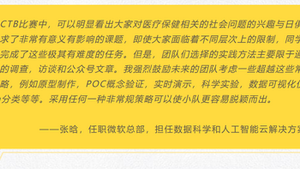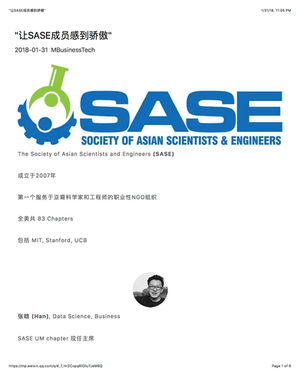My Journey in Philanthropy
- Jun 17, 2017
- 5 min read

Born and raised in China, I wasn’t exposed to too much philanthropy in my youth, compared with my American peers. The Chinese society casts a somewhat nonchalant or even negative view about philanthropy, mostly because of a series of large-scale Red Cross scandals. Back in 2011, there was a sex scandal involving a young maiden and a high-level official at Red Cross of China. Even though Red Cross claimed that it had no connection with the scandal whatsoever, public trust in the organization had diminished quite rapidly. However, whenever there’s an earthquake, flood or any major natural disasters, Chinese people will still raise money for those who are in distress on a nationwide scale, which is actually a fairly significant campaign, even to Western culture’s standard. Other than that, the majority of the philanthropic money goes into Buddhist temples, where the money will be used for expansion and religious decoration.
My family has traditionally been active participants of religious donations, ever since we were converted into Buddhism a couple of years ago. Giving money to the temples is not only a form of good merit according to Buddhist teachings but also a very popular local tradition. It’s what defines social status and philanthropic spirits in Chinese society. After all, you will have to be both rich and kind enough in order to offer a large sum of money to the temples, and that will establish a very good reputation for you in the community.
As an observant Buddhist, I certainly believe contributing to the religious activities in Buddhist tradition is highly worthwhile and honorable, but I also want to explore other facets of philanthropy. Buddha encourages disciples to have mercy on all living beings, and that’s precisely the core value of philanthropy in my opinion. During my freshman year on Michigan campus, I got involved with MoneyThink, a student group that is dedicated to bringing financial education to underprivileged high school students. I would travel and teach with these passionate team members every Friday at nearby high schools, and this has been happening for almost two years now. As college students, we still have very limited knowledge on how to manage our personal financial situation, but we at least have the resources to figure out the best practices, and that’s what we want to pass onto our students. There’s no money donation to these students from our group, but I believe what we bring—our time, knowledge, and experiences—is intrinsically more valuable than money itself. We help students cultivate valuable financial knowledge so that they can be financially independent soon in the future. We encourage them to keep up the good grades and apply for financial aid for colleges. Many of them wouldn’t have considered college otherwise.
I have encountered many cases of religious donations and philanthropic activities throughout my life. During my time in a Catholic high school, my classmates and I are always under the notion that our education is generously supported through the Catholic Diocese we live in, and most of my friends come from families that regularly attend Sunday Church. We would also have weekly mass right in our school. However, unfortunately, we were never encouraged to think about how philanthropy impacts religion, society, and world at large, even though we might have been the direct beneficiaries. It’s the lack of philanthropic education in American education system that makes any sort of non-profit or philanthropic work seem less worthy than a job at Wall Street or some prestigious Manhattan law firms. There is no doubt that businessmen, lawyers, and workers at other highly sought-after occupations make much more money than non-profit philanthropic professionals, but the sheer joy of knowing you are making a direct impact on the issues that you care about cannot be purchased with any amount of money. And that’s why I love to work in development and non-profit field.
D-SIP is a program that is largely designed around the development of higher education. Even though every year there are a few Dobson interns that work for local non-profits, the majority of interns are devoting their whole summer to figuring out how to better our university through development and alumni engagement. While we are busy working on our project at hand, we may sometimes forget why we are doing this internship in the first place. There are thousands of other internships in for-profit sectors available for us, and we chose D-SIP because we wanted to make an impact to future generations of students. We wanted to make our beloved university more affordable, engaging, and beneficial to students. After all, better students make better alumni, and better alumni make a better world.
This summer, my D-SIP project lies within Office of Development and Alumni Relations at Ross School of Business. My main focus is to design reunion events that are engaging, innovative, and inviting for milestone class alumni to attend. In addition, I also need to benchmark against peer business schools to compile a list of best practices in alumni engagement field. Lastly, as part of Michigan Ross’ new initiative to engage with young alumni, a new young alumni program needs to be established and developed, and my job is to create concrete action plans for the program so that it’s ready to be implemented.
As a result, I reached out the Top 11 business schools in the nation and received many valuable feedbacks and insights. The majority of my recommendations are based on peer schools’ existing programs, and they provide a solid, realistic starting point for Michigan Ross to realize its ambitious goal of alumni engagement. Throughout my internship, I learned that philanthropy in higher education is largely donor-centered. Many fundraising activities have monetary donation as one of their bottom lines. However, many schools have also chosen to focus on engaging with alumni with their talent and time, instead of purely their treasure. This is a meaningful distinction because for any kind of relationship, if you go into it with a very materialistic intention, it often tends to end badly. Human interactions and relationship nurturing should always be the forefront of fundraising activities.
Going through my philanthropic journey is a very inspiring moment for me. As a business student, I had never even thought about working for higher education and nonprofit as a development officer. Now it suddenly seems to be a very promising and fulfilling career for me. I’m actively using my strategic thinking and business acumen at my project, and I can’t wait to see what it may bring in the future. I sincerely hope the impact of my project can go far beyond the scope of this summer, and with all the help from my supervisors, instructors, colleagues, and peers, I certainly believe it will.








Comments